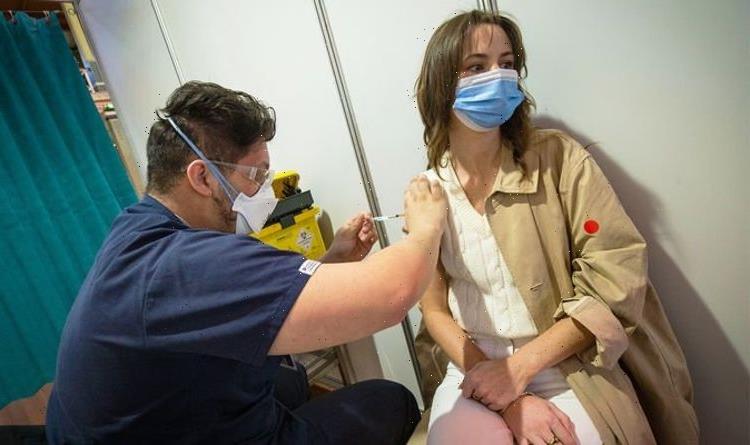Covid: Study on vaccine effectiveness released in UK
We use your sign-up to provide content in ways you’ve consented to and to improve our understanding of you. This may include adverts from us and 3rd parties based on our understanding. You can unsubscribe at any time. More info
The results indicate vaccines offer long-term protection against the coronavirus, even if their efficacy wanes in time. The groundbreaking study calculated vaccine effectiveness in frontline workers across eight sites in the US between December 2020 and August 2021. Researchers estimate vaccines remain up to 80 percent effective – an 11 percent drop on previous surveys.
The figures were based on PT-PCR testing, which detects the presence of viral RNA in collected swab samples.
However, researchers at the University of Utah Health Sciences said the testing did not measure whether there were any changes in efficacy in protecting against hospitalisation and death.
The study’s results were published this week in the Morbidity Mortality Weekly Report (MMWR).
One reason why the vaccines are less effective after eight months may be explained by waning immunity.


It may be a case that the vaccine-activated immune system’s ability to fight the virus weakens over time.
It may also be the case vaccines are not as effective in protecting against the Delta variant of coronavirus.
The Delta variant is much more contagious than the original strain of SARS-CoV-2 and has spread across the US like wildfire in recent months.
According to the US Centers for Disease Control and Prevention (CDC), the Delta variant is up to twice as contagious.
And as of June, the Delta variant has become the leading cause of COVID-19 in the US.
Despite the variant’s worrying spread, health officials maintain vaccines offer the best hope of curbing the deadly pandemic.
Delta variant ‘is a different kind of beast’ says Walensky
Dr Matthew Thiese, of the University of Utah Rocky Mountain Center for Occupational and Environmental Health (RMCOEH), said: “The vaccines are still helping save lives and keep people from getting sick despite a slight diminishing return over many months.
“These data, combined with other data, demonstrate that vaccinated people are much less likely to get GOVID-19 and are much less likely to be hospitalised.”
Dr Thiese and his colleagues examined more than 4,000 frontline workers who have not previously had Covid.
About 3,000 of the participants were fully vaccinated during the study, with 65 percent receiving the Pfizer jab, 33 percent receiving the Moderna jab, and about two percent receiving the single-shot Johnson and Johnson vaccine.
Among the unvaccinated test group, the researchers recorded 194 infections in 181,357 person-days – the combined total of days of testing for this group.


Among the fully vaccinated test group, only 34 infections were recorded in 454,832 person-days.
In that time, the vaccines are 80 percent effective for all fully vaccinated participants.
But the data suggests the vaccines were becoming less effective after five months since full vaccination.
The researchers also found the vaccines appeared less effective in the last 43 days of the study when the Delta variant took centre stage in the US.
However, the researchers noted their sample sizes were too small to be statistically significant and more studies will look into the results.
Dr Thiese said: “These data show that the vaccine is still quite effective against the different strains of COVID-19, including the Delta variant.
“The protection people get from the vaccine is keeping people from getting COVID-19 at a ratio of 14 to one.
“As these data continue to come in, they are going to help chart recommendations for masking, social distancing, and booster shots.”
Researchers in Britain have similarly found the Pfizer and AstraZeneca vaccines wane in efficacy within six months of vaccination.
Data collected by the ZOE COVID study found efficacy fell to between 88 and 74 percent after five to six months.
Source: Read Full Article
